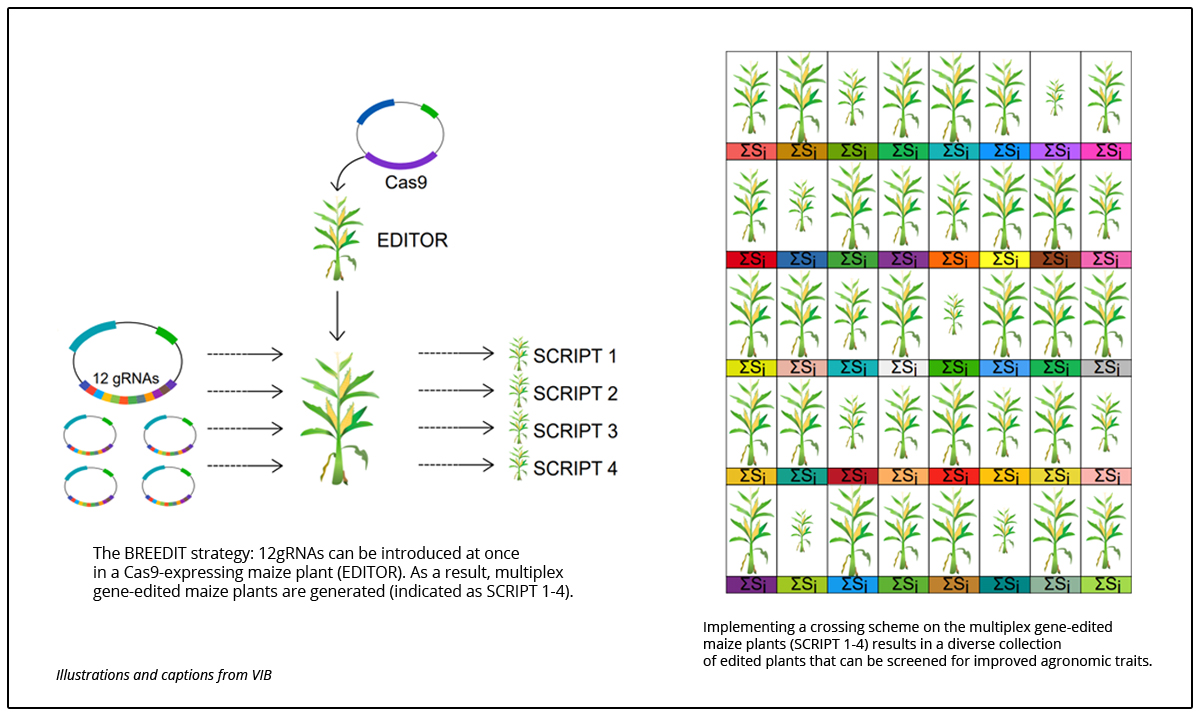
BREEDIT Bridges Gap Between Conventional Breeding and Gene Editing Techniques
September 14, 2022| |
Scientists at VIB-UGent Center for Plant Systems Biology and Flanders Research Institute for Agriculture, Fisheries and Food (ILVO) developed a fast gene discovery pipeline in maize to advance breeding programs for the benefit of humanity and the environment.
Conventional plant breeding involves crossing varieties with the desired traits in their genome. Traits such as growth and yield are often controlled by a complex gene network. To achieve significant growth improvement, breeders need to combine multiple growth-stimulating properties. Molecular biology helps link agronomic traits to specific genes rather than genomic regions, narrowing down the genomic targets for breeding.
The VIB-UGent and ILVO team developed BREEDIT, a support platform for breeding using innovative gene editing techniques. It is a pipeline in which CRISPR-mediated gene editing of multiple genes simultaneously is combined with different crossing schemes to identify the key genes involved in trait enhancement. The BREEDIT team developed a strategy to edit up to 60 genes in all possible combinations. Introducing 12 gRNAs at once into a Cas9-expressing parent generates a multiplex gene-edited maize plant. Implementing a crossing scheme with plants containing a different set of gRNAs leads to a diverse collection of edited maize plants that can be screened for improved agronomic traits.
Prof. Dirk Inzé, BREEDIT project lead (VIB-UGent Center for Plant Systems Biology) said, “BREEDIT provides us with a tool to quickly identify promising gene edits to improve agronomic traits in crops. Especially for complex traits such as yield, gene editing-assisted breeding will become increasingly important to keep up with the changing environment.”
For more details, read the article in VIB News.
| |
You might also like:
- Pocket K No. 13: Conventional Plant Breeding
- Pocket K No. 54: Plant Breeding Innovation: CRISPR-Cas9
- The Current Status of CRISPR-Cas9 Applications in Food and Agri
Biotech Updates is a weekly newsletter of ISAAA, a not-for-profit organization. It is distributed for free to over 22,000 subscribers worldwide to inform them about the key developments in biosciences, especially in biotechnology. Your support will help us in our mission to feed the world with knowledge. You can help by donating as little as $10.
-
See more articles:
-
News from Around the World
- What do you think of this newsletter?
- Nigeria Adopts Guidelines on GM Plants with Stacked Genes
- Researchers Unearth Genome of Wild Shrub from Tomato Family
- US Launches National Biotechnology and Biomanufacturing Initiative
- Canada's Guidelines on Gene Editing to Advance Innovation
- GM Purple Tomato Gets Approval in the United States
- Vietnam’s Animal Biotech Research Capability to Support Gov’t’s Agricultural and Environmental Sustainability Goals
- Asian Regional Workshop on Current and Upcoming Items under the CBD and its Protocols
-
Research Highlights
- Study Reveals Role of CW198 in Enhancer-promoter Interaction in Plants
-
Plant
- BREEDIT Bridges Gap Between Conventional Breeding and Gene Editing Techniques
- Specialty Crops to Hit the Market as First Gene-edited Entrants
- CRISPR Used to Develop Low Glutelin Rice for Phenylketonuria and Kidney Disease Patients
-
Read the latest: - Biotech Updates (December 17, 2025)
- Gene Editing Supplement (December 17, 2025)
- Gene Drive Supplement (February 22, 2023)
-
Subscribe to BU: - Share
- Tweet

